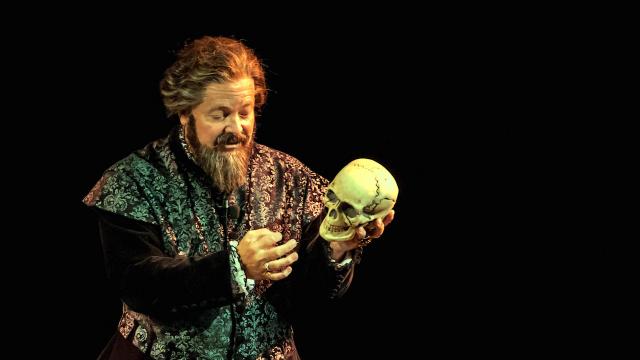Theatre gave me a lot of things. It was a place where my weird mannerisms and silly voices became unique tools. Performing also got me to break out of my shell and stop fearing what others thought of me, which, in turn, helped me learn to accept and be myself. But most of all, theatre taught me how to empathise with others better.
Photo: Bob Muller
To many, acting looks like it’s simply a matter of memorising lines and looking good while you say them. This may be true to some extent in Hollywood productions, but for most performers there’s a lot more to the process. There’s a transformation.
Acting is first and foremost about telling a story through actions and words, but the craft itself is about portraying another person — and sometimes even becoming them. You have to talk how they talk, move how they move, think how they think, and feel what they feel.
[referenced url=”https://www.lifehacker.com.au/2017/02/the-importance-of-empathy-in-everyday-life/” thumb=”https://img.youtube.com/vi/UzPMMSKfKZQ/maxresdefault.jpg” title=”The Importance Of Empathy In Everyday Life” excerpt=”In trying times is more important than ever to consider the feelings of those around you. We are all in our own bubble, with our own unique perspective on the world, and it is crucial for our personal development to understand how other people experience the world.”]
Empathy is a skill that everyone could do well to develop, and theatre, an art where the purpose is to explore what it means to be human, is an excellent teacher. What starts as a fun way to play pretend becomes a way to understand people and what motivates them. Over time, studying characters like Romeo or Hamlet can allow you to see people in the real world through a different lens.
You have no choice but to empathise with your characters, and this ability can carry over to your everyday life. Think about it: there are characters everywhere in your world. What is it like to be your neighbour, your coworker, your boss? How does it feel to be that downtrodden person you see on the news? Can you imagine what it’s like to be that person you despise when they’re at home alone, stressed out and dreading tomorrow?
The mindfulness I garnered through playing fictional characters over the years was truly a gift, and I often tell myself that theatre saved my life — or at least helped me open my eyes. Before I took up acting as a teenager, I flat-out didn’t understand people and their actions.
I didn’t understand why people felt the need to put others down; I didn’t understand why poor people didn’t just work harder; I didn’t understand why rich people didn’t want to share; I didn’t understand why people would want to hurt each other; and I couldn’t fathom why people sought refuge in poisonous inebriation, or why they intentionally broke rules. Honestly, I didn’t like people back then, and I didn’t like what they did.
But theatre gave me insight, understanding, and showed me that I’m no better than the people that once confused me.
[referenced url=”https://www.lifehacker.com.au/2015/01/how-to-handle-rejection-like-an-actor/” thumb=”https://i.kinja-img.com/gawker-media/image/upload/c_scale,fl_progressive,q_80,w_800/grrgpz32hhl3eqhoc6z5.png” title=”How To Handle Rejection Like An Actor” excerpt=”The difference between actors and other working professionals is that they usually spend more time looking for their next job than actually working one. They get a lot more experienced at rejection than your average worker, which means we may able to learn a thing or two from them.”]
Self-reflection is a powerful tool on the road to empathy, and acting can hold a mirror up to your own actions. When you play a part, you often notice things that stick with you. You see a character’s flaws, and sometimes you see those same qualities in yourself. You realise that you’re a character too. And once you’ve played a few different parts, you recognise the power of perspective. One character’s viewpoint isn’t going to be identical to another, just like in real life.
Acting out contrasting scenarios is a stark reminder that people in the real world have different opinions and beliefs, and are willing to fight for them. You begin to better understand personal circumstances and how they can affect somebody’s choices and thought processes. The forces of fate can be stacked against a character the same way they’re often stacked against people in the real world.
When I played Don John in a production of Shakespeare’s Much Ado About Nothing, I got to see what the world looked like through the eyes of a villain. But as I got to know him, I realised he’s so much more than the “bad guy.” He’s an illegitimate son who had been rejected by his society from the moment he was born, and yet, he was still forced to do all the things his more privileged family members did.
In many ways, his malice was justified, and it made me take another look at the “villains” in my life. Maybe they weren’t evil; maybe they were just the products of an unwelcoming environment.
At its core, theatre unveils the complexities of human emotions and explains why people do the things they do — two essential building blocks of empathy. Short of some sort of Freaky Friday-type magic, it’s one of the best options for “walking a mile in someone else’s shoes.”
You can be rich, you can be poor; you can be the oppressor, or the oppressed; you can be a killer, a victim, or both; you can be in love, or never know the taste of a kiss. In theatre, you learn how to be everyone, how to be all types of human, which is a skill I think everyone should have. The world’s a stage and we all play our parts, but perhaps we should spend more time wondering what it would be like to have been cast in a different role.

Comments